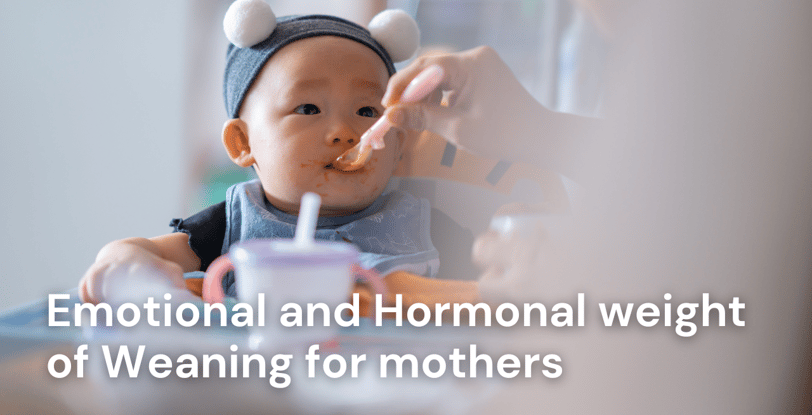The Emotional Impact of Weaning and Hormonal Shifts
7/1/20254 min read


Weaning is often seen as a practical milestone—another box to tick off on the parenting journey. Whether it's initiated gradually, led by the baby, or done abruptly due to necessity, it’s typically framed around physical logistics: timing, nutrition, supply. What’s less talked about—but just as vital—is the emotional and hormonal weight of weaning for mothers.
Many women report unexpected waves of sadness, irritability, or even depression during or after weaning. These feelings can catch them off guard, especially if breastfeeding wasn’t easy or enjoyable to begin with. If you’re feeling unlike yourself after stopping nursing, you’re not imagining it. You're experiencing the very real emotional and physiological aftermath of hormonal shifts during weaning.
At Peace Temple, we work with mothers at every stage of their parenting journey—including this under-discussed, emotional chapter. Weaning isn’t just an end; it’s a transition. And like any major transition, it can stir up powerful and confusing feelings.
Why Weaning Is More Than a Physical Change
Weaning is often a layered decision: personal, emotional, medical, logistical. It marks the closing of a deeply intimate chapter between mother and baby—a chapter that, for many, involved sacrifice, bonding, and identity.
Even when weaning is intentional or welcomed, it can be accompanied by feelings such as:
Grief or nostalgia
Guilt over stopping “too soon”
Fear about losing the emotional bond
Identity confusion (“If I’m not nursing anymore, who am I now?”)
Mood swings or tearfulness without a clear trigger
These aren’t irrational feelings—they are emotionally and hormonally driven responses to a major biological shift.
The Hormonal Landscape of Weaning
The act of breastfeeding maintains elevated levels of prolactin (the milk-making hormone) and oxytocin (the love and bonding hormone). These hormones don’t just support milk production—they also help regulate mood and reduce stress.
When breastfeeding stops, especially abruptly, the body goes through a significant hormonal adjustment:
Prolactin levels drop, leading to reduced feelings of calm and contentment.
Oxytocin plummets, which may trigger emotional vulnerability or sadness.
Estrogen and progesterone fluctuate, similar to the postpartum period or PMS.
In some cases, dopamine drops may contribute to mood dips, especially in women already sensitive to hormonal shifts.
These biochemical changes can lead to symptoms that mimic postpartum depression, often referred to as post-weaning depression. At Peace Temple, we help clients recognize these changes for what they are: a temporary neurochemical recalibration, not a failure or weakness.
Emotional Themes That Commonly Arise During Weaning
1. Grief and Loss
Weaning—especially if unplanned—can feel like a loss of closeness, identity, or even purpose. The intimacy of nursing can be irreplaceable for some mothers, making its end feel like a quiet heartbreak. Even when the choice is empowering, grief can still coexist.
2. Guilt
In a culture that romanticizes extended breastfeeding while offering little real-world support for it, guilt is almost inevitable. Mothers may feel guilty for stopping “too early,” for not enjoying nursing, or for feeling relief that it’s over.
We remind our clients at Peace Temple that guilt is not proof of wrongdoing—it’s often a reflection of internalized expectations, not actual harm.
3. Anger or Resentment
Mood swings, impatience, and irritability are common during hormonal withdrawal. Some women even experience a delayed emotional crash weeks after stopping breastfeeding. These feelings aren’t signs of being “ungrateful” or “overdramatic”—they are signs of hormonal turbulence and emotional recalibration.
4. Relief and Ambivalence
Interestingly, some mothers feel both sad and relieved at the same time. Weaning can restore autonomy, reduce stress, or allow for medical or lifestyle changes. Feeling two things at once—grief and gratitude, sadness and pride—is not contradictory; it’s completely human.


When Weaning Triggers Mental Health Challenges
For mothers already managing postpartum depression, anxiety, or trauma, weaning can act as an emotional accelerator. The sudden hormonal dip may resurface depressive symptoms or heighten existing anxiety.
Warning signs that weaning may be impacting mental health include:
Persistent low mood or tearfulness
Feeling emotionally numb or withdrawn
Sleep disturbances unrelated to baby’s schedule
Loss of appetite or excessive fatigue
Intrusive thoughts or overwhelming guilt
Inability to bond with or feel connected to the baby
At Peace Temple, we specialize in maternal mental health care that supports women during these vulnerable transitions, offering both emotional validation and evidence-based treatment plans.
How to Emotionally Support Yourself Through Weaning
Whether you’re days or months into weaning, it’s never too late to prioritize your emotional wellness. Here are practical ways to care for yourself:
1. Acknowledge the Transition
Even if you’re physically ready to stop nursing, give yourself space to emotionally process the change. Journal, talk to a therapist, or speak your feelings aloud. Don’t bottle them up.
2. Normalize the Feelings
Mood changes after weaning are common, natural, and not a sign of weakness. Knowing you’re not alone can lessen the shame and anxiety that often accompany hormonal shifts.
3. Go Slow, If Possible
Gradual weaning allows hormones to adjust more gently. Tapering off one feed at a time—especially evening or comfort feeds—can ease both emotional and physical discomfort.
If you’ve already weaned abruptly, it’s okay. You can still support your body and mind with intentional rest, nourishment, and professional guidance.
4. Focus on Connection in Other Ways
Weaning does not mean the end of bonding. Eye contact, babywearing, singing, skin-to-skin touch, and playtime all build connection without milk. These rituals help reinforce emotional closeness as breastfeeding ends.
5. Seek Professional Support
If the emotional fallout from weaning feels heavy, persistent, or isolating, talk to a mental health professional. Peace Temple’s therapists offer warm, informed, and individualized care to help mothers navigate post-weaning transitions.
Final Thoughts: Honoring the Ending
Weaning is not just about stopping milk—it’s about navigating an ending. And endings are always layered: they carry relief, grief, nostalgia, and sometimes a silent sadness no one warned you about.
Whether you nursed for two days or two years, whether it was joyful or fraught with difficulty, the act of weaning still represents a turning point. It is emotional because it matters. It is hormonal because your body is involved. And it is difficult not because you are weak—but because you are deeply, biologically, and emotionally connected to your child.
At Peace Temple, we hold space for the grief and the relief. For the celebration and the sadness. Because weaning is not just a medical event—it’s a moment of transformation.
And all transformations deserve tenderness.
